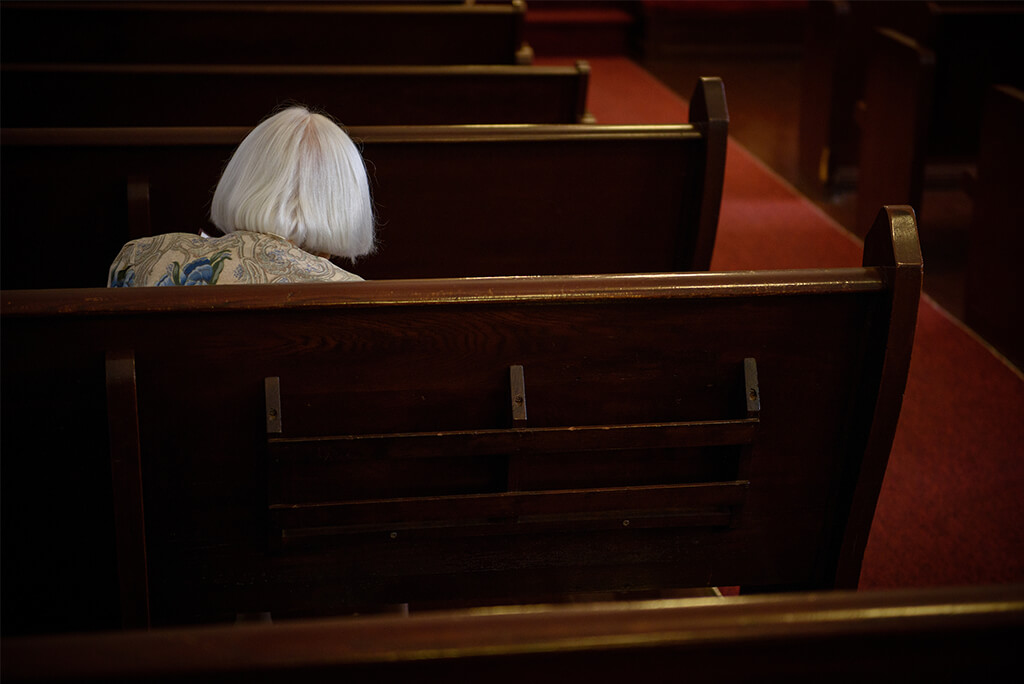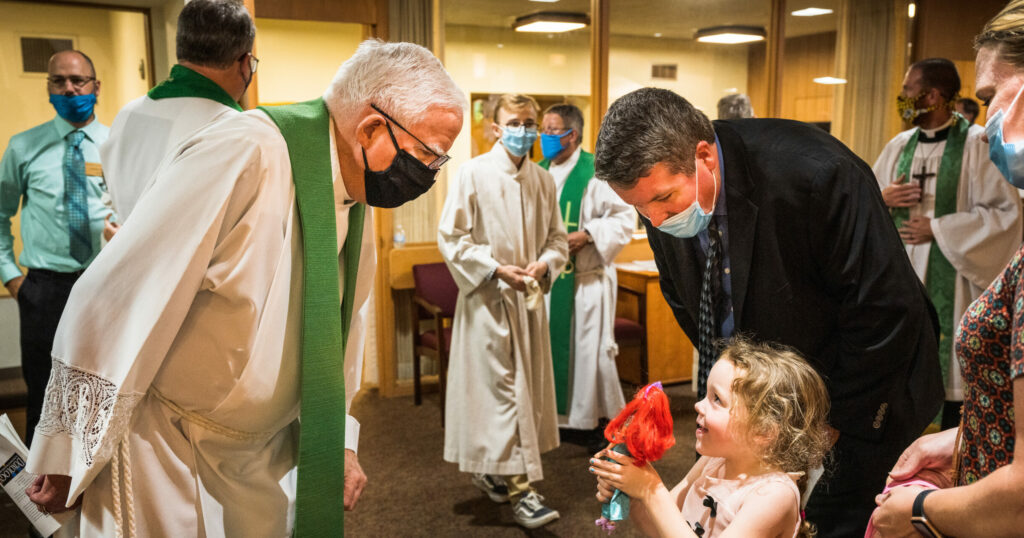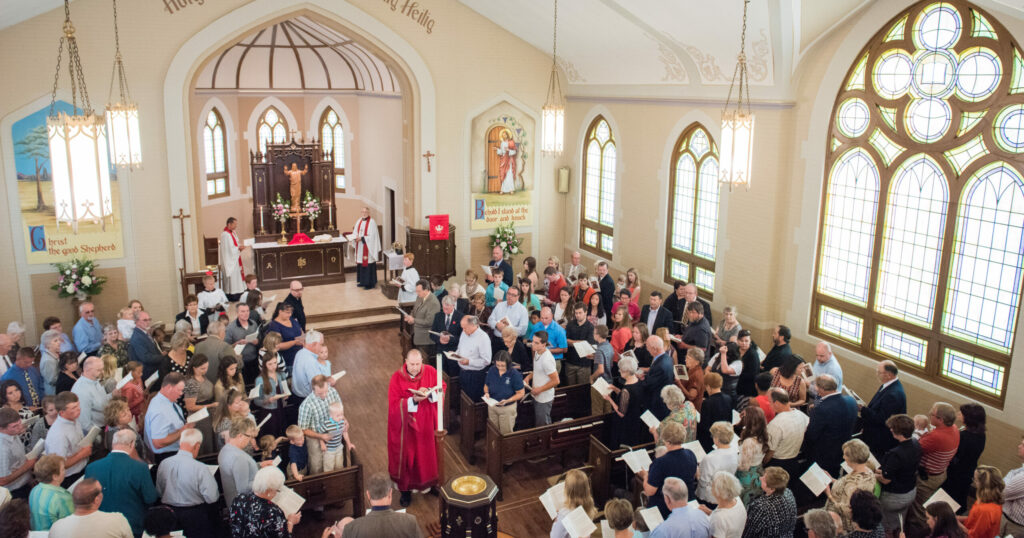by David Petersen
Many passages in Holy Scripture speak of the church as being God’s family. We are the sons or children of God, His own people, and His Name is upon us. We are truly brothers and sisters not only of Jesus Himself but also of one another. One of my favorites is Psalm 68:5–6:
Father of the fatherless and protector of widows is God in his holy habitation. God settles the solitary in a home; he leads out the prisoners to prosperity, but the rebellious dwell in a parched land.
Even before the Fall, it was not good when Adam was alone. So God made Eve in order to set them both into a family. To be fatherless or a widow, whether literally or figuratively, is not good. All people need other people. We need to be loved and we need to give love to others. While God doesn’t need someone to love or for us to love Him, He is love. Our need for love is part of bearing His image.
In Psalm 68, God speaks of fixing the brokenness of being alone. He sets each of us into His family or home. We are His children and we are given to one another in and for love. Thus writes St. John: “Beloved, let us love one another, for love is from God, and whoever loves has been born of God and knows God” (1 John 4:7).
Therefore congregations ought to be free of any lonely people. None of our members should ever have the sense that they don’t fit in or belong or that they go unnoticed by their brothers and sisters.
But, of course, as we all know, the Church Militant struggles to live up to its promise. The Church is not utterly distinct from biological or legal families. Brothers and sisters fight. Parents fail. Husbands and wives don’t always treat one another with respect and kindness. Congregations reflect the struggle against the Old Man that every individual Christians knows on this side of glory.
Every one of us experiences the contrast between the biblical descriptions of what the church is in Christ (and what it will be in the new creation) and what it is now. Every one of us finds this contrast to be disappointing and frustrating. However, for those who struggle with loneliness or depression and are most desperate for the love we owe one another, it can be devastating and a serious threat to faith itself.
In the throes of that real sadness, it is tempting for those who are hurt to cast the blame on others. Often the blame is just, and we should not excuse lack of love in our congregations nor any bad behavior. Love is not optional. Again, we owe it to one another, as St. Paul exhorts, to “love one another with brotherly affection” (Rom. 12:10). Jesus also mandates this on the night of His betrayal: “A new commandment I give to you, that you love one another: just as I have loved you, you also are to love one another. By this all people will know that you are my disciples, if you have love for one another” (John 13:34–35).
That being said, even as we continue to embrace, love and strive for the ideal as expressed in Scripture, it would be prudent for many of us to lower our expectations. We must recognize that all of us on this side of glory have baggage and weaknesses — including those who aren’t as welcoming or as kind as they should be or who treat brothers and sisters as “outsiders.” Every Christian who has ever snubbed an unmarried person in the congregation or failed to include the less fortunate or socially awkward, has been dealing with his own sins, relationship problems and insecurities. This isn’t an excuse for bad behavior. It is simply a recognition that in the church we all need help. When our help is most needed, it often has to be requested and pointed out. So also even when we are mistreated or neglected, St. Peter admonishes us, above all, to: “keep loving one another earnestly, since love covers a multitude of sins” (1 Peter 4:8).
The congregation is the family of God. That is a true statement even when it doesn’t feel or act much like a family. The reality is, we each belong to that family by grace. God is our Father. Jesus is our brother. The Spirit abides in us as His temples. By that grace, we also belong to one another. We owe one another affection, kindness and attention.
Especially when or if our brothers and sisters fail us, we need to remember the admonition from the author to the Hebrews: “let us consider how to stir up one another to love and good works” (Heb. 10:24). The lonely or those who otherwise feel neglected or out of place in the congregation need to teach their brothers and sisters their obligations and the love they owe both by admonitions and example, always remembering the planks in their own eyes.
In short, being placed in the family of God isn’t only about finding contentment and peace and joy in a family. It is also a set of obligations and duties that we have toward one another. We are to love as we are loved, looking past weaknesses, covering sin and striving together to walk according to our calling in service to one another. Loneliness can actually be overcome, at least in part, on this side of glory, by suffering some awkwardness and embarrassment and keeping on. It isn’t only the lonely who need love, the loveless and unfriendly among us need love also, that they might expand their own horizons and strive to walk according to the calling we all have.
Photo: LCMS Communications/Erik M. Lunsford






When I was young, I loved my mother so much. But she had untreated mental illness, and I experienced a lot of neglect, distance, and criticism. When I was six, my school reported her to social services. I always tried to get her approval, my whole life. I was able to forgive her, and after I became a mother, we became good friends. She loved our son and was a wonderful grandmother. She died eight months ago after a rare, terrible illness. Many, many friends from my congregation came to her funeral, which was jam packed. I was really touched. My mother was a Protestant but not a Lutheran. Since then, my church friends have all but “disappeared.” I think they are avoiding me because they know that my mother meant so much to me, and they don’t know what to say. Our pastor recently accepted a call elsewhere, or I would have paid him a visit. I’ve returned to choir and although people have been friendly, not one of them has ever asked me how I am doing. I have been a member of this LCMS congregation for about 25 years and suddenly feel invisible. I’m really struggling and if it weren’t for God, I would be alone. I don’t expect anybody to fix my grief, of course. I would have just liked to have felt like I still mattered and belonged. I find myself thinking of leaving and attending my mother’s former church, but I am a Lutheran. I have since learned that it is not uncommon for friends to “disappear” after you lose someone. It’s a double loss in a sense, but all it takes is a simple “I’m praying for you” or “How are you doing?” To communicate that you care. I never imagined that I would be so devastated after my mom died and never expected to feel so abandoned, unloved, and forgotten, like I no longer belong. Anyway, if you are currently dealing with grief, I’m praying for you. I also know that Jesus is with me and will never abandon me. Thank you for allowing my comment.
The same Jesus who said to “love one another” (John 13:34) explained the outcome he had in mind: “These things I have spoken to you, that my joy may be in you, and that your joy may be full” (John 15:11 ESV).
Because of God’s grace toward us, each of us always has the very best reason to bring grace into each of our encounters with another person. Each meeting is an opportunity to bless and to be blessed, to teach and to learn, to understand better and to be understood better.
We say much of preaching, much less of listening. Yet there can be genuine love in simply asking cordially how someone else is doing and then listening attentively to their response. And joy might be found not only in the simple act of connecting, but in knowing that by listening you have brought something valuable to someone in demonstrating that their thoughts, feelings and experiences are worth hearing about.
In my own experience, not being knowledgeable about the numerous psychological aspects of social interactions, and the motivations which direct our behavior, I have observed over the decades of my life that some people prefer to be more reserved and aloof as a temperamental axiom of their character. It may be a learned behavior, not inherent, but it exists inside and outside of the church. As a student in high school, I remember watching other students interact in the typical cafeteria model: there were the “cool” kids, the large cliques of outgoing kids, and the “jocks” and other athlete types, the “nerds” and the musicians, and there were the loners who sat by themselves, while I sat at a table with two others every lunch period. We preferred our own comfort zone, being mostly average, not overly sociable, not aloof, yet not over friendly. In church, believers often fall into the exclusive cliques, not unfriendly, but unwilling to reach out to visitors. Perhaps, leading by example, Pastors, elders, and deacons, should be the first ones to break the ice.